During CD phase, the architect notices plumbing lines clash with roof trusses. What should the architect do first?
A family-owned apple farm in the Upper Midwest is taking advantage of a change in the local zoning code that added a new Agri-Tourism class in the existing farm zone. This allows the Owner to build a new facility on their existing site. The building will be open to the public and include a brewery, distillery, tap room, and market. The architect is ready to submit the drawings to the Owner for the 50% construction documents review.
To accommodate a compressed construction schedule, the Owner will be utilizing a design-build process. The Contractor has submitted the Pre-Engineered Metal Building (PEMB) shop drawings to the Architect for review, due to the lead time on this critical path item. Once construction begins, farming operations must be able to continue uninterrupted.
Key project information includes:
Brewing and distilling will operate year-round.
Brewery will initially include four fermenting tanks. Owner has requested space for at least two additional tanks. Potential expansion will be based on future sales.
Distillery will produce 16% alcohol, which is classified as a flammable liquid. Fire separations are required.
Tap Room is designed with seating for 300 people, not including exterior patio seating. It will have views to the working orchards and the historic buildings on site.
Tap Room is scheduled to be open from August through November. Owner would like options to extend operating dates based on popularity.
The Market area will feature local farm products and is not conditioned.
Entire building will be fully sprinklered.
Selected building materials are low-maintenance, as requested by the Owner, for durability and to reflect the nature of a working farm.
Mechanical and electrical systems will be hung from the building structure. These loads are included in PEMB shop drawings.
Public water and sewer is not available at the Project Site.
Occupancy sensors are included to reduce utility costs and achieve energy conservation requirements.
The following resources are available for your reference:
Architectural Drawings, including plans, elevations, sections, and schedules
Consultant Drawings, including structural, HVAC, power distribution, and plumbing
PEMB Shop Drawings
Design and Construction Schedule
Specification Excerpts, showing relevant spec sections
IBC and ADA Excerpts, showing relevant code and accessibility sections
After reviewing the documents, the architect discovers a coordination issue in the corridor.
The owner decides to triple the size of the distillery component of the project to make hand sanitizer and wants to use the Tap Room spaces adjacent to the brewery and distillery for this purpose.
Which of the following must the architect reevaluate and change to accommodate this request? Check the three that apply.
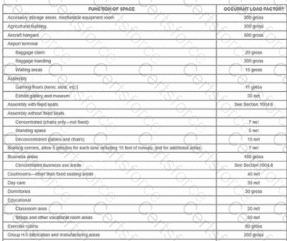
Refer to the exhibit.
An architect is designing a multipurpose room that will operate daycare services as well as exercise classes. The multiple occupancies within the space utilize components of the same means of egress system.
What is the occupant load factor that should be used in calculating egress?
Which of the following documents should be coordinated in the design of a barrier-free building entrance?
The single-line diagram for the electrical distribution system shown is for a multi-family project.
Click in the box on the single-line diagram where the transformer is located.
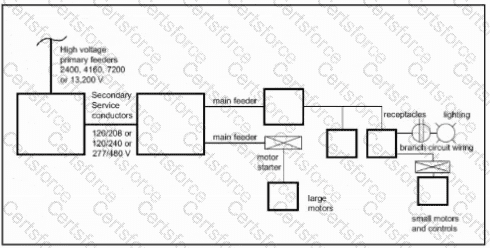
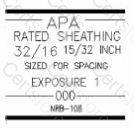
Refer to the exhibit.
For a plywood panel carrying the grade stamp shown, which of the following is the maximum recommended span for use in a floor system?
Proposed trees along a residential street next to a new development site should first be selected based on which of the following?
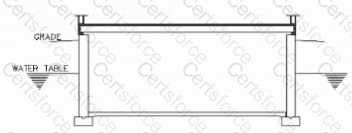
Refer to the exhibit.
During spring rains, the foundation walls around the basement space, as illustrated, experience an increase in lateral pressures.
Which one of the following is also a major concern?
An architect is designing a sub-surface drainage system that outfalls into a site retention pond. The recommended shape, size, and slope of the drainage lines need to be determined for primarily which of the following purposes?
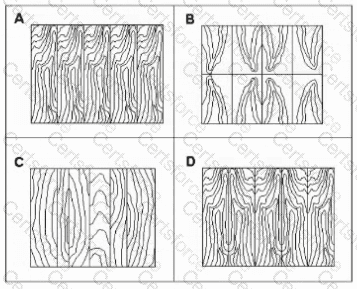
Refer to the exhibit.
Which of the following examples of wood paneling depicts the method of "slip matching" between adjacent wood veneers?